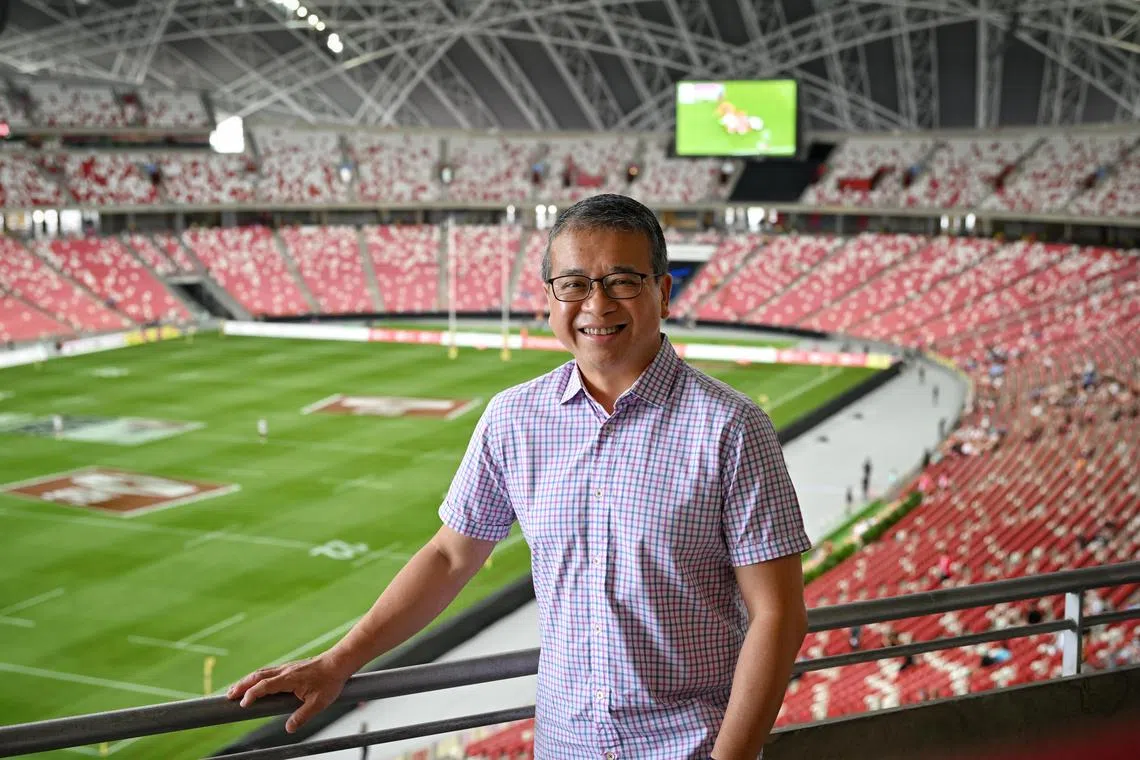Concert tourism a growth area Singapore can tap into: Edwin Tong
Sign up now: Get ST's newsletters delivered to your inbox

Minister for Culture, Community and Youth Edwin Tong said that concert tourism “is a growth area that we can tap into”.
ST PHOTO: KUA CHEE SIONG
Follow topic:
SINGAPORE - The back-to-back, high-revenue generating concerts seen in the first quarter of 2024 are not likely to recur, given the rare scale of the Taylor Swift and Coldplay concerts.
But concert tourism “is a growth area that we can tap into” and one that has “unlocked a potential that was latent previously”, Minister for Culture, Community and Youth Edwin Tong told The Straits Times.
Mr Tong noted that the advent of streaming services means music acts have to tour as streaming generates only a fraction of what album sales used to do 10 to 15 years ago.
“When you analyse the travel patterns of the major Western acts, they’re very much focused on touring Europe and United States, (markets that) are already very saturated, whereas in Asia, as we have seen, the demand is there with more acts coming (to the region to play) for more nights… there is headroom for growth,” he said.
He was responding to a question on whether the Republic is looking to plant a flag here as a concert destination, given the success of a run of four blockbuster concerts by top-tier acts in the first four months of 2024.
Coldplay was estimated to have brought in over 200,000 fans to the National Stadium Swift drew more than 300,000 fans
According to private sector estimates, these two shows injected up to $450 million into the Singapore economy, bringing high international visitor arrivals, high hotel occupancy rates and tourism revenue.
Ed Sheeran commanded a crowd of 60,000 for his one-day show on Feb 16 – a record for the National Stadium that was broken a mere few weeks later by Swift on one night, which drew close to 63,000.
Mr Tong noted that there cannot always be such high-value concerts as they are cyclical in nature, and 2024 happened to see big shows “opportunistically bunched up together” at the start of the year.
Without revealing more, he said the Singapore Sports Hub will see “comparable acts, names that you would recognise” in the latter half of the year.
It was announced last week that American pop star Olivia Rodrigo will play her first concert here
Exclusivity deals, such as the one Singapore secured for the run of six Taylor Swift concerts in March,
While the deal proved successful, he said “you can’t repeat it all the time”.
“It’s really the calculation of the artistes themselves, to decide where they play, and for how long... the economics must work for them,” he said.
“We can’t do this for every case but we are aware of the options, and we will have all these as tools for us when we go into negotiations.”
Asian countries racing to build new concert venues
With millions in tourism revenue to capture, other countries in Asia are not resting on their laurels. Several large-scale venues in the region are set to open in the coming years.
These include the Kai Tak Sports Park in Hong Kong, which comprises a 50,000-seat stadium, 10,000-seat indoor sports centre and 5,000-seat public sports ground. The venue is aiming for a 2025 opening.
The 15,000-capacity Bangkok Arena, built by Thai retailer The Mall Group and sports and live entertainment company AEG, is slated for a 2026 opening.
Industry observers like Ms Angela Hanlee, a senior gaming and hospitality analyst for Bloomberg Intelligence, noted that regional competition is high, with cities such as Bangkok, Jakarta and Kuala Lumpur already offering mega-sized stadiums, enabling global stars to perform to big audiences.
Mr Tong said: “We see this competition and we have to make sure Sports Hub stays ahead of the game, by making sure the team (at Kallang Alive Sport Management, or KASM) is proactive, and our facilities here are top-class.” KASM took over the running of the Sports Hub in December 2022.
Singapore is already doing this: It is replacing the 12,000-capacity Singapore Indoor Stadium, which is almost 35 years old, with a new “best-in-class” indoor arena
“Offering diversified options of event grounds is important, as artistes’ concerts and music festivals might require different types of performance stadiums,” said Ms Hanlee, adding that Singapore is a leading destination in the region when organisers take into consideration a country’s infrastructural capabilities. These include accommodation options, flight connectivity, local transportation, and safety and security.
Besides such capabilities, Singapore also meets or exceeds criteria that event organisers of entertainment events are looking for, including a ready and substantial base of local fans and potential event attendees, as well as a supportive Government, said Mr Benjamin Cassim, a senior lecturer for the diploma in hospitality and tourism management course at Temasek Polytechnic.
He said Singapore is well-equipped to claim the concert tourism space in the region, as it is able to present a very strong case to such organisers looking for event destinations.
Singapore’s steady pipeline of upcoming events is not limited to concerts.
“While we recognise the draw of live entertainment, it is only one of many ways to profile (Singapore) and attract visitors,” said Ms Ashlynn Loo, STB’s director for attractions, entertainment and tourism concept development.
She added that the statutory board provides support for leisure events that generate strong tourism benefits and global branding value for Singapore.
Earlier in May, major sporting events such as the HSBC SVNS rugby tournament
“This is why we work closely with our partners to bring in a diverse mix of high-quality leisure events – ranging from major sporting and lifestyle events to music, arts and cultural events – to remain a compelling destination for all to enjoy,” said Ms Loo.


